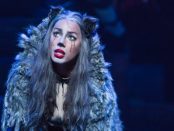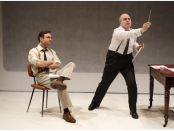Four Quartets
In her selection of the movements and structure of "Four Quartets," Tamowitz chose to ignore the depth and imagery of the poems, producing a cool Merce Cunningham-like ballet that glided along beautifully on the surface of Eliot’s heavy, sometimes distasteful, imagery. Movements were balletic, full of arabesques, skittery connecting steps, soft leaps and jumps. She built the work upon a series of steps and phrases that are repeated in various ways: jumped, turned, performed alone, performed in unison and performed in reverse. One salient image was that of a dancer jumping into the arms of another. Other than that there was very little touching. The barefoot dancers often mimicked each other or performed side by side. Only two duets occurred, one quite long near the end, watched by the other cast members gathered at the corners of the set. [more]




